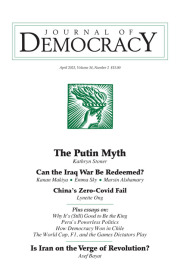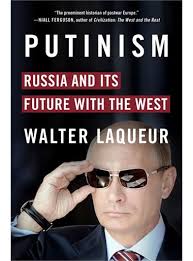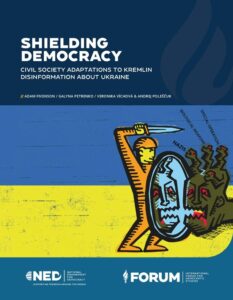 Putin’s ill-fated war in Ukraine risks the complete annihilation of the myth of autocratic competence, notes Kathryn Stoner, the Mosbacher Director of Stanford University’s Center on Democracy, Development and the Rule of Law and senior fellow at the Hoover Institution. Russia’s example demonstrates the importance of identifying and analyzing changes in the quality of autocracies, and calls for a better understanding of why autocracies become more reliant on violent repression than on spinning an informational narrative of legitimacy and competence.
Putin’s ill-fated war in Ukraine risks the complete annihilation of the myth of autocratic competence, notes Kathryn Stoner, the Mosbacher Director of Stanford University’s Center on Democracy, Development and the Rule of Law and senior fellow at the Hoover Institution. Russia’s example demonstrates the importance of identifying and analyzing changes in the quality of autocracies, and calls for a better understanding of why autocracies become more reliant on violent repression than on spinning an informational narrative of legitimacy and competence.
What does all this tell us about the vulnerability of Putin’s regime? she asks in the Journal of Democracy:
While popular approval ratings appear to indicate that he maintains broad social support, it is hard to interpret polls in an autocracy that increasingly governs not by using the media to extol its competence but through fear. In such a context, we might expect preference falsification—saying anything rather than what you really think—to stay out of trouble. Nonetheless, survey data show a rather significant generation gap in support for Putin and for the war. We also see some Russians rebelling—protesting openly until the regime’s violent crackdown and voting with their feet by leaving the country. RTWT
 Personalist leaders like Putin are particularly challenging adversaries, argues Brown University’s Rose McDermott, and a contributor to the recent book, “The Fragile Balance of Terror“:
Personalist leaders like Putin are particularly challenging adversaries, argues Brown University’s Rose McDermott, and a contributor to the recent book, “The Fragile Balance of Terror“:
- First, they operate under fewer organizational and institutional constraints—such as courts, parliaments, or legislatures—than democratic leaders, while privileging loyalty over competence in their advisers. They privilege loyalty because they often remain more concerned about an internal coup than an external strike. This allows corruption to run rampant and limits the availability of expertise. It also inclines such leaders toward paranoia because they have to remain constantly vigilant against threats of overthrow that often are synonymous with assassination.
- Second, their ability to maneuver without much restraint gives free rein to idiosyncratic personality dynamics, especially narcissism. One of the many problems with narcissistic self-focus is that it privileges what the leader thinks is best for him without regard to the costs and consequences of the larger body politic…..
- Last, such leaders tend not to learn well from their own mistakes or those of others, not least because they surround themselves with sycophants who always validate their views, giving them a distorted sense of their own skills, abilities, and knowledge.
Trying to see things from their perspective opens up the possibility for novel forms of deterrence that rely more on psychology, and less on economics or violence, to manage their potentially erratic behavior, she writes for Lawfare. These creative approaches would also recognize the greater risk for conflict and escalation these leaders pose—awareness of which should shape the diplomacy of more democratic states.
 The American withdrawal from Afghanistan in 2021 likely contributed to Putin’s thinking that the United States was disengaging from the world and he could get away with an invasion of his neighbor without paying a steep price, the George W. Bush Institute’s Igor Khrestin and David J. Kramer contend. Abandoning Ukraine and its European allies would send a similar signal to Chinese leaders, raising the risk of a Taiwan contingency.
The American withdrawal from Afghanistan in 2021 likely contributed to Putin’s thinking that the United States was disengaging from the world and he could get away with an invasion of his neighbor without paying a steep price, the George W. Bush Institute’s Igor Khrestin and David J. Kramer contend. Abandoning Ukraine and its European allies would send a similar signal to Chinese leaders, raising the risk of a Taiwan contingency.
Russia’s brutal war against Ukraine is approaching a critical turning point, they write for The Bulwark. As the Russian offensive grinds down in the Donbas, Ukraine is preparing for a major counteroffensive with the intent to liberate all of its territory. We must help Ukraine win—the future of a Europe whole, free, and at peace hangs in the balance—as do hopes of deterring Chinese moves against Taiwan.







